The first clear criterion is the author’s association with intellectual and public circles that opposed violence and repression in 2020, and that refused to accept post-election political falsehoods. Bacharevič, with his dystopian novel Dogs of Europe and the defiant Mr A’s Last Book, is seen by the authorities as dangerous for portraying the system as a self-reproducing mechanism of violence. A day before the novel’s official ban, the propaganda newspaper SB. Belarus Segodnya wrote: “In Dogs of Europe, there is active propaganda inciting social, political, and ideological hostility between citizens and state officials, calling people to mass disorder for the illegal seizure of power.”
The second vector is the return of memory and Belarusian history. Arłoŭ’s Fatherland is not only about the past but about heritage, dignity, and national identity. Through a Belarusian lens, it dismantles Soviet ideological myths – something officials again perceive as a threat. Such books rewrite the code of a nation: restoring forgotten heroes, dismantling alien historical myths, and revealing the depth of national roots. When censorship erases Fatherland, it deprives Belarusians of the right to their own history.
The third factor is the recording of reality through documentary literature. Books perceived as honest testimonies or chronicles are especially alarming to the regime. Belarusian Donbas by Andrejeva and Iljaš is not only about Belarusians fighting in Ukraine but also about the Belarusian authorities’ involvement in Russian war crimes. This is more than literature – it is evidence. And evidence is what they want to destroy.
The fourth line concerns the Belarusian idea, faith, and sense of mission. Pavieł Sieviaryniec, straddling the line between literature and political writing, depicts Belarus as a Christian nation with a Gospel calling. The banning of his works Stone Heart, I Love Belarus: 200 Phenomena of the National Idea, and Belarusalem shows that the regime seeks to eliminate any form of cultural vision for Belarus’s future. Even when they pose no threat of physical confrontation, they affirm a moral alternative. Sieviaryniec’s political religiosity and devotion to Christian discourse directly challenge Russia’s militarised “Orthodox” imperialism and thus cannot be accommodated in state ideology matrices.
The fifth vector is the mere fact of text belonging to the Belarusian cultural community that has emerged since 1991. These works are not only literature but also a testament to the existence of free Belarusian thought in the post-Soviet era.
Through banning the works of outstanding contemporary authors, the regime seeks to erase the achievements of three decades of independent Belarusian literature. It aims to restore Soviet-style thinking and a hollow patriotism without a nation, to erase individual authors and suppress the very possibility of alternative Belarusian identity, to bury the idea of resistance, self-determination, and the right to an independent cultural future.
Voices of book
Below are selected voices of banned books (an author’s selection; the complete list is available on our website)
![]()
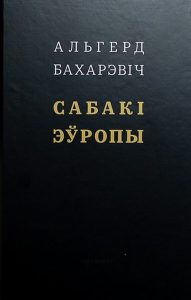
«Dogs of Europe»
Alhierd Bacharevič
Minsk: Łohvinaŭ, 2017; Minsk: Januškievič, 2021
Date of ban: 17.05.2022 (National List of Extremist Materials)
The first Belarusian work of fiction to be labelled as “extremist” by the Ministry of Information. In Belarus, the novel received second place in the Jerzy Giedroyc Prize and was named 2017 Book of the Year. In 2025, Bacharevič was awarded the Leipzig Book Prize for European Understanding, while the translator received the Paul Celan Prize for best translation into German. The Russian translation was shortlisted for the Big Book Award (2019). The novel has been translated into Russian, German, and Polish.
Voice of the Book: I was banned because I am a book about the language of power and the power of language. I am a merciless satire of the dead utopia of Ł ukašenka’s “stability”. I offer a bleak vision of a future in which the Russian Empire annexes Belarus. I speak of Russian fascism and of an empire that unleashes a new world war. I am European literature, written in Belarusian by a free writer. My central theme is freedom.
The book has been translated into Russian and German.
![]()
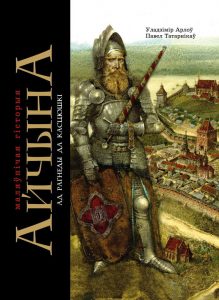
«Fatherland. A Pictorial History. From Rahnieda to Kaściuška»
Uładzimir Arłoŭ, Pavieł Tatarnikaŭ
Minsk: Technalohija, 2016–2019
Date of ban: 18.10.2022 (National List of Extremist Materials)
A richly illustrated collection of engaging and educational stories from Belarusian history, from antiquity to the late 18th century. The book won the Ciotka Prize for best children’s book. Until 2020, Arłoŭ’s works in English and German were presented by the Belarusian Foreign Ministry to foreign delegations. Its success reflected the cultural awakening taking place in society before 2020.
Voice of the Book: I am the history of memory, eternal. I was banned because I revealed that Belarus has its own chronicle, not a Russian one. In it are Euphrosyne, Skaryna, Kalinoŭski — national figures who lived not for empires. The regime that serves an occupier cannot accept this. It has agreed to be a provincial corner of the empire, an appendage of the “Russian world”. That is why I am destroyed – to leave Belarusians without a Fatherland, without roots for the future. I became a mirror of historic dignity: in it, a people who cannot be forced to accept another’s truth.
The book has been translated into English “Belarus: An illustrated history”.
The authorities admitted for the first time that they destroyed publications they labelled as “extremist”. Evidence comes from the court ruling, which sentenced a resident of Kobryn to ten days of arrest for “spreading extremism” – Uładzimir Arłoŭ’s book Fatherland: A Colorful History. From Rahnieda to Kasciuška, which he kept in his home library.
![]()
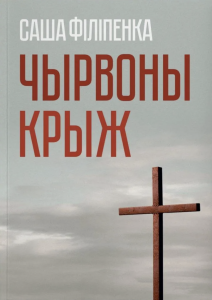 «Red Crosses»
«Red Crosses»
Sasha Filipenko
Kraków: «Gutenberg», 2025
Date of ban: 13.11.2025 (National List of Extremist Materials)
Date of ban: 30.09.2025 (Official list: “Harmful to National Interests”)
“Red Cross” is one of Sasha Filipenko’s most powerful novels. In it, a young football referee named Sasha meets a 91-year-old woman in Minsk who survived the Stalinist Gulag and carries within her the painful memory of the twentieth century. It is a book about the human soul resisting oblivion, about the questions we long to ask God, and about an unexpected connection between generations. The novel has received wide international acclaim and has been translated into dozens of languages.
![]()
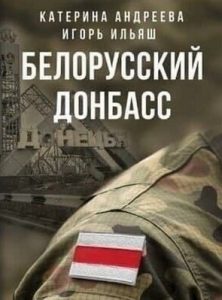
«Belarusian Donbas»
Kaciaryna Andrejeva, Ihar Iljaš
Kharkiv (Ukraine): Folio, 2020
Date of ban: 26.03.2021 (National List of Extremist Materials)
A documentary book by two imprisoned writers: Andrejeva, convicted for “state treason”, and Iljaš, accused of “facilitating extremist activity” and “discrediting Belarus”.
Voice of the Book: I am testimony that tore the mask off Ł ukašenka’s propaganda. My lines hold the truth: since 2014, Belarus has been part of Russia’s war against Ukraine, supplying mercenaries and exporting death to Donbas. Belarusians also fought on the Ukrainian side, but unlike the others, they were persecuted at home. I was punished for telling the truth: banned, while my authors, Andrejeva and Iljaš, were thrown behind bars for years.
![]()
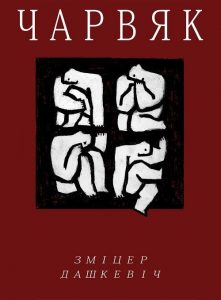
«The Worm»
Źmicier Daškievič
Vilnius (Lithuania): Gudų Information Centre, 2013
Date of ban: 11.02.2025 (National List of Extremist Materials)
Zmicier Daškievič was an imprisoned writer, released on September 11, 2025
Voice of the Book: I was written on a prison bunk, amid stench, cruelty, and darkness, and I testify: torturers fear a spirit that does not break. They want people to believe not in ideas but in fear. I was banned because I shattered the image of the “obedient prisoner” — broken, submissive. Yet truth echoes in my pages: even in chains, a person can remain free. Now my author is once again incarcerated, a political prisoner. At home, his wife and four children await him.
![]()
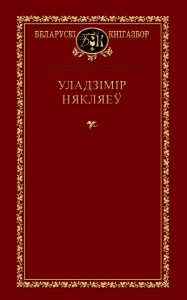
«Selected Works»
Uładzimir Niaklajeŭ
Minsk: Knihazbor, 2009
Date of ban: 15.08.2023 (National List of Extremist Materials)
Voice of the Book: I am the collected works of one of the best-known Belarusian poets – a recognised classic, Nobel nominee, and presidential candidate in 2010 – forced into exile in Poland after the 2020 protests. In my verses lies free Belarus: its pain and tenderness, strength and dignity. I was banned because true poetry does not bow its head. And in this, I anger those who wish books to be lifeless.
![]()
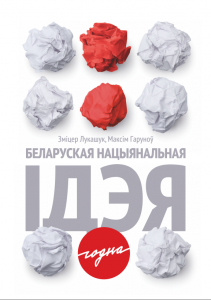
«The Belarusian National Idea»
Źmicier Łukašuk, Maksim Goryunov
Minsk: Medisont, 2020
Date of ban: 17.05.2022 (National List of Extremist Materials)
Voice of the Book: I am a book of dialogue. Within me are 85 interviews on Belarus’s national idea, 600 pages of text, and thousands of vivid thoughts – the result of two years of work under the “Idea X” project. Former state leaders, civic figures, activists, and bloggers reflect on the country, society, and their vision of the future. I was banned because those reflections pose a threat to a regime that wants us to surrender our destiny into its hands, leaving us without our own idea – and without ourselves.
![]()
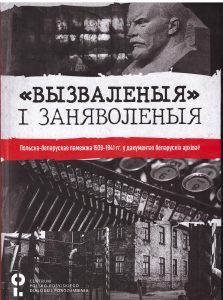
«“The freed” and Enslaved»
Alaksandr Smalančuk
Minsk: Źmicier Kołas, 2021
Date of ban: 12.01.2023 (National List of Extremist Materials)
Voice of the Book: I am documentary truth about the borderlands – geographic and moral. I reveal how Western Belarus was annexed into the Soviet empire in 1939. I analyse 137 archival documents and communist press publications – showing reality through the lens of Stalinist ideology. I was banned because I destroyed the myth of the Soviet “liberation mission”. I declare that such “freedom” comes with a bullet to the head. And my memory is an intolerable mirror for a regime once again pulling Belarus into imperial embrace.
![]()
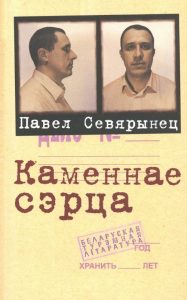
«Stone Heart»
Pavieł Sieviaryniec
Minsk: Human Rights Centre “Viasna”, 2018
Date of ban: 20.06.2024 (National List of Extremist Materials)
Voice of the Book: I am the confession of a man who believes in God, in Belarus, and in the Belarusian path. My author, political prisoner Pavieł Sieviaryniec, wrote his essays over 20 years of detention in labour camps, prisons, and short-term cells. Incidentally, Stone Heart is the nickname for the KGB prison in Minsk. I was published as part of the “Belarusian Prison Literature” series. I was banned because a party or system does not dictate my faith; because I am too truthful, too pure, and therefore too uncompromising toward the regime and its propaganda.
![]()
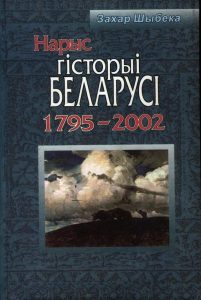
«Outline of Belarusian History (1795–2002)»
Zachar Šybieka
Minsk: Encyclopedics, 2003
Dates of ban: 27.12.2024 (National List of Extremist Materials), 21.11.2024 (the list of books “harmful to national interests”)
Voice of the Book: I am a textbook for those who refuse to be victims of ideological manipulation. This is an author’s concise synthesis of Belarusian history in a European context. I focus on aspects of the past most distorted by propaganda. I was banned because I teach people to think, not to parrot. I insist: history is not a cutting table for power, but a space for seeking truth.
![]()
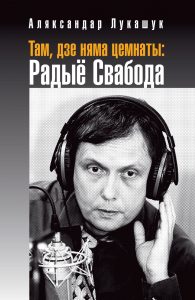
«Where There Is No Darkness: Radio Liberty»
Alaksandr Łukašuk
Prague (Czechia): Vesna, 2024
Date of ban: 23.05.2025 (National List of Extremist Materials)
Voice of the Book: I am the story of a voice that broke through the Iron Curtain. I tell of Radio Liberty. My author, Alaksandr Łukašuk, headed the Belarusian Service for 25 years and knows countless facts. Often, he must code names and details to protect his colleagues’ safety. That, too, is part of today’s Belarusian truth, and of Łukašenka’s unfreedom. I was banned because I shed light on the darkness in my country.
![]()
